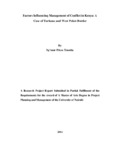| dc.description.abstract | The conflict between Turkana and Pokot communities has been occurring frequently for since independence. This has mostly been prevalent along the borders regions of the two areas. With the advent of new constitution, it was expected that the new county governance would help restore peace and cohesion among the two communities. It is one year down the line and it is not known whether devolution, religious groups‟ activities, civil societies, and culture have affected the management of cross-border conflict between the two regions. The purpose of this study was to investigate the factors influence the management of cross-border conflict between West Pokot and Turkana along Turkwel power station and Akwulo water reservoir. The objectives of the study were to determine the influence of culture and traditions, religious groups, civil societies and devolution on management of cross-border conflict between Turkana and West Pokot. The study theoretical framework was underpinned from conflict transformation model of Kumar Rupesinghe. Descriptive survey research design was used and the mixed method design was chosen to carry out the study. The target population comprised of 1553 residents living on the two sides of the border, 20 county security committee members and 4 chief security officers from the two counties. The sample size for residents was derived from Kathuri and Pals table for sample size determination. The residents sampled will be selected through stratified random sampling technique while the key informants were selected through purposive sampling technique. The study used questionnaires, interview schedules and documentary evidence as instruments for data collection. The instruments were tested for validity and reliability. Data collected was analysed descriptively for quantitative data and thematically for qualitative data. Data analysed was presented in tables, pie charts and graphs. The study findings showed that devolution, civil society, religious groups and cultural traditions and elders played a significant role in management of cross-border conflict between Turkana and West Pokot. For instance, the members of the clergy were found to be at the forefront in advocating for peace, giving hope to victims, they were involved in disarmament exercises and some of them organised regular peace meetings. Moreover, 77.2% believed that devolution has tried to resolve cross-border cross border conflict since coming into force in 2013. The study recommends that dialogue should be initiated between the two county government, religious leaders should be impartial, civil society should implement projects benefiting the two communities and the traditional elders decisions made during mediation meetings should be followed to the later to avoid future conflict occurrence It is expected that the results of the study will be of beneficial to both the county governments, national governments, residents living across the border and future researchers. | en_US |

